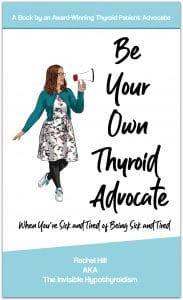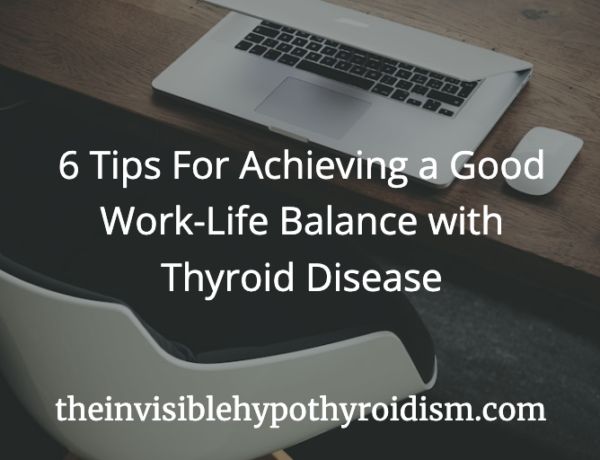Many of us have wondered if our thyroid condition can be cured, and whilst for most of us, we’re unfortunately stuck with it for life, there are some forms of thyroid disease that can come and go.
The Type That Stays
Hypothyroidism is usually with us for life. Whether it is caused by the autoimmune disease Hashimoto’s or not, has a non-autoimmune cause such as a thyroidectomy (removal of the thyroid gland), pituitary problem or just plain not working properly, the vast majority of us have hypothyroidism for life.
Hashimoto’s, the most common cause of hypothyroidism, is also with us for life and cannot be cured. Hashimoto’s can be put into remission though and as of February 2019, mine is in remission. Put simply, ‘remission’ means that the Hashimoto’s has become well controlled, with lowered to zero antibodies, but you still have the condition for life.
Related Article: Why It’s Important to Know if You Have Hashimoto’s
Hypothyroidism Caused by Environmental Issues
Hypothyroidism caused by non-autoimmune issues, such as an environmental issue, does have the possibility to be ‘cured’ and reversed, if for example it is caused by:
- A diet low in iodine
- A Vitamin D deficiency
- Over consumption of soy
- Mould exposure
- Too much oestrogen
- Viral infection/s
- Medications that can suppress thyroid function, such as: those for hyperthyroidism, the heart arrhythmia drug amiodarone, lithium, the hepatitis C and Cancer treatment interferon alpha and the cancer drug interleukin
If one of the above is the cause for the hypothyroidism, then removing or ‘fixing’ the issue could reverse the hypothyroidism, but these unfortunately aren’t the sole cause behind hypothyroidism for most people.
Subclinical Hypothyroidism
It appears that not everyone who has subclinical or ‘borderline’ hypothyroidism progresses to full blown hypothyroidism and can in fact return to normal thyroid function completely.
However, many of us with subclinical hypothyroidism do gradually worsen with time and benefit from even a small dose of thyroid medication. I was told my hypothyroidism was ‘only borderline’ but due to the sheer amount of symptoms I had (over twenty) and my thyroid antibodies being off the charts (diagnosing Hashimoto’s as the cause) it was clear that this was only going to get worse with time.
I’m very thankful that I got treatment for my ‘only borderline hypothyroidism’ when I did.
If you have had a subclinical result, your doctor will usually retest a few months later and, if it is following the trend of becoming higher (and thus, moving you more towards worsening thyroid hormone levels) may start you on medication which you may need for life. Regular blood tests will be required to determine whether medication is needed for life or the long term.
Related post: Does Borderline Hypothyroidism Need Treatment?
Postpartum Thyroiditis
Postpartum Thyroiditis occurs when the thyroid gland becomes inflamed after pregnancy. This conditions occurs in about 5-7% of women within a few months of giving birth.
Most women who experience postpartum thyroiditis are said to return to normal thyroid function after around a year, however, around a third develop permanent hypothyroidism. [1], [2]
Subacute Thyroiditis
Subacute thyroiditis is a rare thyroid condition, thought to be caused by a viral infection, as it often occurs following one – such as the mumps, flu or a cold.
The purpose of treatment for subacute thyroiditis is to reduce pain and inflammation and treat hyperthyroidism or hypothyroidism, if they occur. Treatment for subacute thyroiditis is usually temporary, as doctors aim to eventually wean the patient off any medications that have been prescribed to treat the condition, as they recover.
The symptoms of subacute thyroiditis usually go away within one to two years, however, hypothyroidism may end up being permanent and thyroid hormone replacement medication needed for life. The American Thyroid Association estimates that only 5% of people with subacute thyroiditis develop permanent hypothyroidism. [3] So this form of thyroid disease almost always reverses.
Sporadic Thyroid Levels
Some people with autoimmune thyroid disorders, such as Hashimoto’s, can occasionally have sporadic or erratic thyroid test results, which may show as moving between hypothyroidism, hyperthyroidism and normal thyroid function.
These do, however, tend to generally worsen overtime as permanent thyroid function is lost and an eventual diagnosis of hypothyroidism that is here to stay, is given.
Did you know that some thyroid conditions could reverse?
You can click on the hyperlinks in the above post to learn more and see references to information given.
Find this article helpful? The book Be Your Own Thyroid Advocate: When You’re Sick and Tired of Being Sick and Tired, goes in to more detail and discusses how thyroid patients can better manage their thyroid condition and thrive.
References:
[1] https://www.nhs.uk/Conditions/thyroiditis/Pages/Introduction.aspx#post-partum
[2] https://www.btf-thyroid.org/information/leaflets/38-pregnancy-and-fertility-guide
[3] https://www.thyroid.org/thyroiditis/





